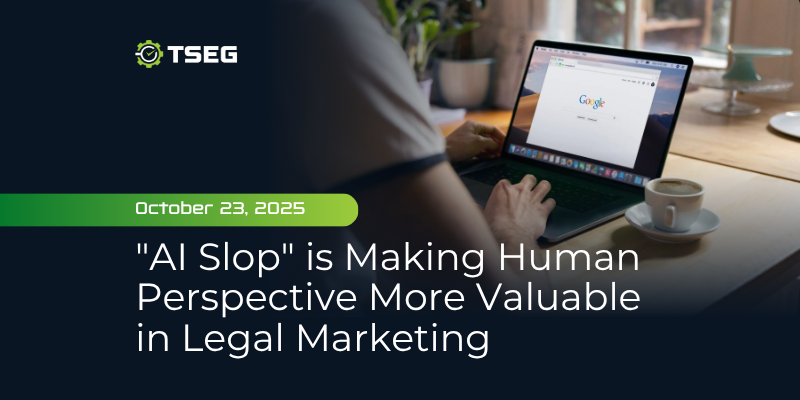“AI Slop” is Making Human Perspective More Valuable in Legal Marketing
Posted on Thursday, October 23rd, 2025 at 6:10 pm
Google Is Raising the Bar on What Counts as Quality
Google’s Vice President of Search, Liz Reid, recently explained that content lacking depth or original perspective is now being treated as low value, even spam. Pages that restate common knowledge without adding anything new are being pushed down in AI Overviews.
Reid said that Google’s system learns directly from user behavior. What people click, ignore, or exit from determines what appears in results. Quality now depends on usefulness and clarity rather than length or keyword density.
This update is moving things away from repetitive content. What performs best today is material created with insight, expertise, and a clear point of view.
The full interview can be viewed here:
Depth and Originality Lead to Higher Engagement
Liz Reid explained that users engage more with content that goes deeper than a basic summary. According to the click data coming from AI Overviews, people are drawn to pages that offer added value, not those that simply repeat what’s already been stated in the snapshot.
Reid noted that thin content often results in what Google calls a bounce. A user clicks the link, quickly realizes the page adds nothing new, and returns to the results. That kind of behavior signals to Google that the content does not deserve to be ranked. By contrast, pages that offer analysis, specificity, or original thought tend to hold the user’s attention longer and generate stronger trust signals.
Writers who focus on substance are more likely to stand out. This means offering more than a list of facts or restated headlines. When a reader lands on a page and finds thoughtful commentary or practical insight, they stay longer, read more, and are more likely to take the next step.
Users Respond to Content That Feels Authentically Human
During the same conversation, Liz Reid pointed to a consistent trend in user behavior. People are more likely to click on content that feels personal, specific, and clearly written by someone with real insight. Content that reads like it was assembled from generic sources, even if technically accurate, tends to be ignored.
She made it clear that Google’s systems do not automatically “downrank” content based on whether it was written by a human or AI. Instead, the deciding factor is whether the page delivers a clear point of view. When a writer shares a distinct perspective or adds personal context, users recognize the difference.
Pages that perform well often include signs of lived experience or professional judgment. Readers want to know what the writer actually thinks, not just what they found in other search results. Reid emphasized that this type of content builds trust and keeps users from bouncing back to the AI Overview. That deeper engagement tells the system the content is worth showing again.
Writers who bring their own understanding to the subject matter are earning better placement. For firms that want stronger visibility in AI-driven results, the content should reflect direct knowledge of the issues clients are searching for and offer something that cannot be found in a quick summary.

Google Is Prioritizing Expertise and Penalizing Repetition
Liz Reid gave one of the clearest signals yet that Google is no longer tolerating content that adds nothing new. She explained that the definition of spam has been expanded to include pages that offer little value, even if they contain accurate information. If a page simply repeats what is already common knowledge, it is treated the same way as low-quality filler.
She pointed out that Google is rewarding pages that reflect effort and understanding. Content created by someone with a real grasp of the subject stands out. Reid described this as work that shows signs of care and expertise. Google now gives more ranking weight to pages that reflect thoughtful analysis, original insight, or personal experience with the topic.
Repetition has become a ranking liability. Writers who rely on existing summaries or recycled phrasing will fall behind. Content that performs well today shows that the author put time into creating something specific, not something generic.
For attorneys, this means the bar is higher than simply publishing accurate information. Success depends on showing the reader what you know and why it matters. The more depth and clarity you bring to the content, the better your chances of earning visibility in AI Overviews.
Content That Performs in AI Overviews Starts with Strategy
Google’s recent updates have made one thing obvious. Content that rises to the top is not just well written. It is planned with purpose. Liz Reid’s comments point to a system that now favors thoughtful, experience-driven writing over repetition or volume publishing. That change presents a real opportunity for firms that take content seriously.
TSEG helps law firms develop content strategies that meet this standard. Our team works with attorneys to build content that showcases their expertise and meets the expectations of search systems powered by AI. With the right plan, your content can do more than appear in results. It can give people a reason to choose your firm. Contact us today.
